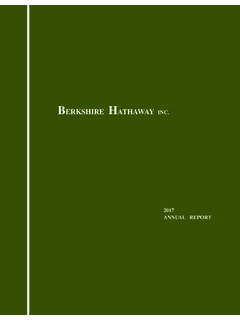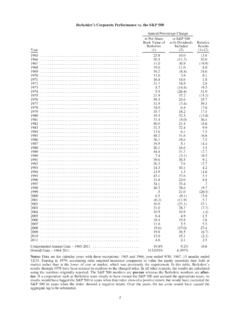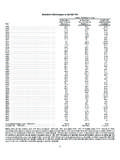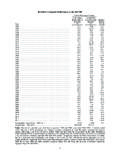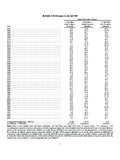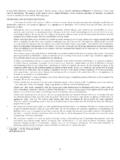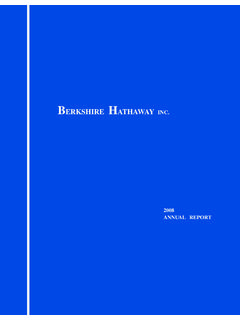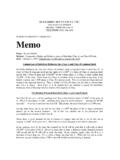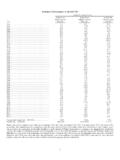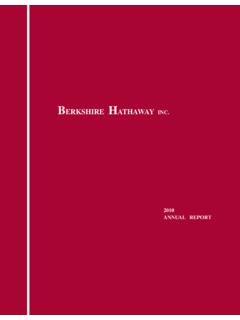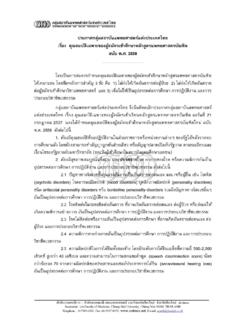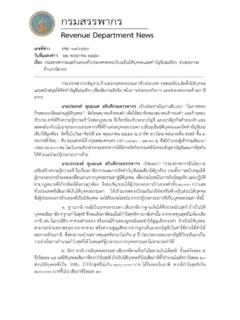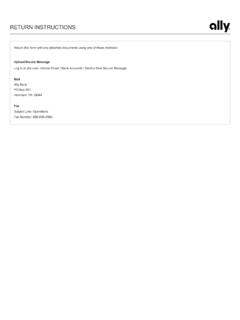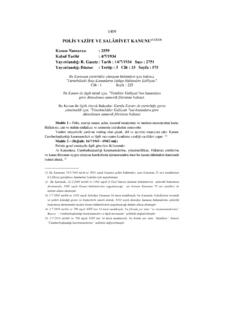Transcription of BERKSHIRE HATHAWAY INC.
1 REPORTBERKSHIRE HATHAWAY ANNUAL REPORTTABLE OF CONTENTSB erkshire s Performance vs. the S&P s Letter*..3 Acquisition Financial Data for the Past Five s Report on Internal Control Over Financial of Independent Registered Public Accounting Financial s s to Minimize Investment Stock Estate Brokerage and Officers of the Back Cover*Copyright 2017 By Warren E. BuffettAll Rights ReservedBerkshire s Performance vs. the S&P 500 Annual Percentage ChangeYearin Per-ShareBook Value ofBerkshirein Per-ShareMarket Value ofBerkshirein S&P 500with ( )( ) ( ) ( ) ( )( ) ( )( ) ( ) ( ) ( ) ( )( ) ( ) ( ) ( ) ( ) ( )( ) ( )( )( ) ( ) ( ) Annual Gain Gain ,319%1,972,595%12,717%Notes:Data are for calendar years with these exceptions: 1965 and 1966, year ended 9/30; 1967, 15 months ended 12/31. Starting in 1979,accounting rules required insurance companies to value the equity securities they hold at market rather than at the lower of cost or market, whichwas previously the requirement.
2 In this table, BERKSHIRE s results through 1978 have been restated to conform to the changed rules. In all otherrespects, the results are calculated using the numbers originally reported. The S&P 500 numbers arepre-taxwhereas the BERKSHIRE numbers areafter-tax. If a corporation such as BERKSHIRE were simply to have owned the S&P 500 and accrued the appropriate taxes, its results would havelagged the S&P 500 in years when that index showed a positive return, but would have exceeded the S&P 500 in years when the index showed anegative return. Over the years, the tax costs would have caused the aggregate lag to be HATHAWAY the Shareholders of BERKSHIRE HATHAWAY Inc.: BERKSHIRE s gain in net worth during 2016 was $ billion, which increased the per-share book valueof both our Class A and Class B stock by Over the last 52 years (that is, since present management tookover), per-share book value has grown from $19 to $172,108, a rate of 19% compounded annually.
3 *During the first half of those years, BERKSHIRE s net worth was roughly equal to the number that reallycounts: the intrinsic value of the business. The similarity of the two figures existed then because most of ourresources were deployed in marketable securities that were regularly revalued to their quoted prices (less the taxthat would be incurred if they were to be sold). In Wall Street parlance, our balance sheet was then in very largepart marked to market. By the early 1990s, however, our focus was changing to the outright ownership of businesses, a shiftthat materially diminished the relevance of balance sheet figures. That disconnect occurred because theaccounting rules (commonly referred to as GAAP ) that apply to companies we control differ in important waysfrom those used to value marketable securities. Specifically, the accounting forbusinesseswe own requires thatthe carrying value of losers be written down when their failures become apparent.
4 Winners, conversely, areneverrevalued ve experienced both outcomes: As is the case in marriage, business acquisitions often deliversurprisesafterthe I do s. I ve made some dumb purchases, paying far too much for the economic goodwill ofcompanies we acquired. That later led to goodwill write-offs and to consequent reductions in BERKSHIRE s bookvalue. We ve also had some winners among the businesses we ve purchased a few of the winners very big but have not written those up by a have no quarrel with the asymmetrical accounting that applies here. But, over time, it necessarilywidens the gap between BERKSHIRE s intrinsic value and its book value. Today, the large and growing unrecorded gains at our winners produce an intrinsic value for BERKSHIRE s shares thatfarexceeds their bookvalue. The overage is truly huge in our property/casualty insurance business and significant also in many time, stock prices gravitate toward intrinsic value.
5 That s what has happened at BERKSHIRE , a factexplaining why the company s 52-year market-price gain shown on the facing page materially exceeds itsbook-value gain.* All per-share figures used in this report apply to BERKSHIRE s A shares. Figures for the B shares are 1/1500thofthose shown for We Hope to AccomplishCharlie Munger, BERKSHIRE s Vice Chairman and my partner, and I expect BERKSHIRE snormalizedearning power per share to increase every , of course, will sometimes decline because ofperiodic weakness in the economy. In addition, insurance mega-catastrophes or other industry-specificevents may occasionally reduce earnings at BERKSHIRE , even when most American businesses are doing s our job, though, to over time deliver significant growth, bumpy or not. After all, as stewards ofyourcapital, BERKSHIRE directors have opted to retain all earnings. Indeed, in both 2015 and 2016 BERKSHIRE rankedfirst among American businesses in the dollar volume of earnings retained, in each year reinvesting manybillions of dollars more than did the runner-up.
6 Those reinvested dollars must earn their years, the gains in underlying earning power we achieve will be minor; very occasionally, thecash register will ring loud. Charlie and I have no magic plan to add earnings except to dream big and to beprepared mentally and financially to act fast when opportunities present themselves. Every decade or so, darkclouds will fill the economic skies, and they will briefly rain gold. When downpours of that sort occur, it simperative that we rush outdoors carrying washtubs, not teaspoons. And that we will earlier described our gradual shift from a company obtaining most of its gains from investmentactivities to one that grows in value by owning businesses. Launching that transition, we took baby steps making small acquisitions whose impact on BERKSHIRE s profits was dwarfed by our gains from marketablesecurities. Despite that cautious approach, I made one particularly egregious error, acquiring Dexter Shoe for$434 million in 1993.
7 Dexter s value promptly went to zero. The story gets worse: I used stock for the purchase,giving the sellers 25,203 shares of BERKSHIRE that at yearend 2016 were worth more than $6 wreck was followed by three key happenings two positive, one negative that set us firmly onour present course. At the beginning of 1996, we acquired the half of GEICO we didn t already own, a cashtransaction that changed our holding from a portfolio investment into a wholly-owned operating , with its almost unlimited potential, quickly became the centerpiece around which we built what I believeis now the world s premier property/casualty , I followed the GEICO purchase by foolishly using BERKSHIRE stock aboatloadofstock to buy General Reinsurance in late 1998. After some early problems, General Re has become a fineinsurance operation that we prize. It was, nevertheless, a terrible mistake on my part to issue 272,200 shares ofBerkshire in buying General Re, an act that increased our outstanding shares by a whopping My errorcaused BERKSHIRE shareholders to give far more than they received (a practice that despite the Biblicalendorsement is far from blessed when you are buying businesses).
8 Early in 2000, I atoned for that folly by buying 76% (since grown to 90%) of MidAmerican Energy, abrilliantly-managed utility business that has delivered us many large opportunities to make profitable andsocially-useful investments. The MidAmericancashpurchase I was learning firmly launched us on ourpresent course of (1) continuing to build our insurance operation; (2) energetically acquiring large and diversifiednon-insurance businesses and (3) largely making our deals from internally-generated cash. (Today, I would ratherprep for a colonoscopy than issue BERKSHIRE shares.)Our portfolio of bonds and stocks, de-emphasized though it is, has continued in the post-1998 period togrow and to deliver us hefty capital gains, interest, and dividends. Those portfolio earnings have provided usmajor help in financing the purchase of businesses. Though unconventional, BERKSHIRE s two-pronged approachto capital allocation gives us a real s our financial record since 1999, when the redirection of our business began in earnest.
9 Duringthe 18-year period covered, BERKSHIRE s outstanding shares grew by only , with most of the increaseoccurring when we purchased BNSF. That, I m happy to say, was one issuance of stock that made good Earnings(in billions of dollars)YearOperations (1)CapitalGains (2)YearOperations (1)CapitalGains (2) ( ) ( ) ( ) (1) Including interest and dividends from investments, butexcludingcapital gains or losses.(2) In very large part, this tabulation includes onlyrealizedcapital gains or losses. Unrealized gains andlosses are also included, however, when GAAP requires that expectation is that investment gains will continue to be substantial though totally random as totiming and that these will supply significant funds for business purchases. Concurrently, BERKSHIRE s superbcorps of operating CEOs will focus on increasing earnings at the individual businesses they manage, sometimeshelping them to grow by making bolt-on acquisitions. By our avoiding the issuance of BERKSHIRE stock, anyimprovement in earnings will translate into equivalent per-share gains.
10 **Our efforts to materially increase the normalized earnings of BERKSHIRE will be aided as they have beenthroughout our managerial tenure by America s economic dynamism. One word sums up our country sachievements: miraculous. From a standing start 240 years ago a span of time less than triple my days onearth Americans have combined human ingenuity, a market system, a tide of talented and ambitiousimmigrants, and the rule of law to deliver abundance beyond any dreams of our need not be an economist to understand how well our system has worked. Just look around the 75 million owner-occupied homes, the bountiful farmland, the 260 million vehicles, the hyper-productivefactories, the great medical centers, the talent-filled universities, you name it they all represent a net gain forAmericans from the barren lands, primitive structures and meager output of 1776. Starting from scratch, Americahas amassed wealth totaling $90 s true, of course, that American owners of homes, autos and other assets have often borrowed heavilyto finance their purchases.
